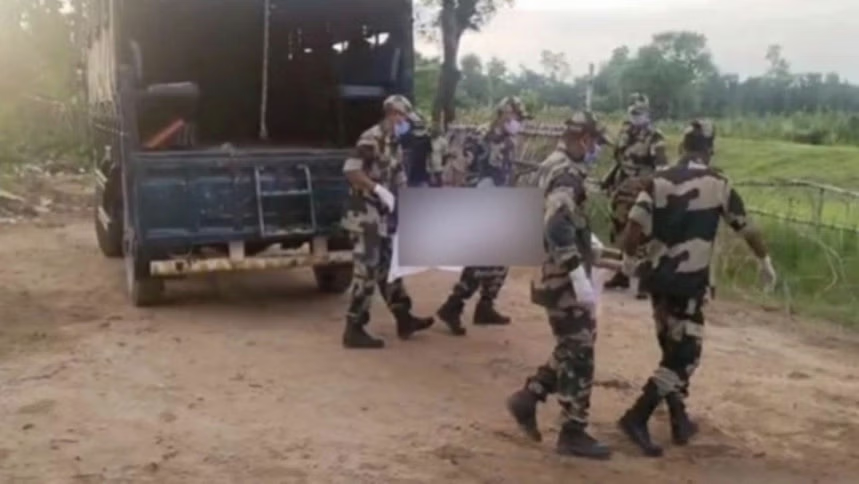Bangladesh has lodged a formal protest with the Indian government following the killing of a 13-year-old Bangladeshi girl, Swarna Das, by the Indian Border Security Force (BSF). On Thursday, September 5, a letter of protest was sent to the Indian High Commission in Dhaka, in which Bangladesh strongly condemned the brutal incident and expressed deep concern.
Swarna Das, a resident of Juri Upazila in Moulvibazar, was shot dead by BSF on September 1. The Bangladeshi government termed the killing both unnecessary and unjustified, stating that such incidents violate the provisions of the 1975 Joint Indo-Bangladesh Guidelines for Border Authorities.
In the protest note, Bangladesh urged the Indian government to ensure that such heinous incidents do not recur. Additionally, Bangladesh called for an investigation into the killing and demanded that the responsible individuals be identified and brought to justice. The letter emphasized the importance of upholding peace and cooperation along the border, asking for immediate action to prevent further loss of innocent lives.
The Bangladesh-India border, stretching over 4,096 kilometers, is considered one of the most volatile and heavily militarized borders in the world. Over the years, the Indian Border Security Force (BSF) has been responsible for a series of incidents involving the killing of unarmed Bangladeshi civilians. Since 2001, more than 500 Bangladeshi citizens have reportedly been killed in incidents involving BSF personnel. These killings have ranged from accidental shootings to instances where individuals, including farmers, traders, and even children, were targeted, often while attempting to cross the border or while engaging in minor cross-border activities such as cattle herding or small-scale trading.
The deaths at the border have sparked outrage within Bangladesh, leading to protests and official diplomatic complaints from the Bangladeshi government to India. Despite bilateral agreements and guidelines aimed at promoting peaceful border management, these incidents continue to occur. The killings highlight a pattern of excessive force, where unarmed civilians are shot, often without warning, even when they do not pose a direct threat.
One of the key factors contributing to the volatility is the militarized nature of the border. The BSF is tasked with patrolling and securing India’s side, particularly to prevent illegal migration, smuggling, and other cross-border activities. However, their methods of dealing with perceived threats have been widely criticized for their brutality. In many cases, the victims are not armed criminals but ordinary citizens, including women and children, often from impoverished communities, who rely on informal cross-border trade for their livelihood.
This ongoing violence has led to widespread criticism from human rights organizations. Groups like Human Rights Watch (HRW) and Amnesty International have condemned the BSF’s “shoot-to-kill” policy, labeling it as disproportionate and inhumane. They have pointed out that many of those killed were innocent, unarmed, and posed no real threat to border security. HRW, in particular, has published reports calling for accountability and urging both India and Bangladesh to implement border management practices that prioritize human rights.
One of the most tragic aspects of these killings is the impunity with which they occur. Despite diplomatic protests, including formal complaints from the Bangladeshi government, very few BSF personnel have been held accountable for the deaths of Bangladeshi citizens. Investigations, if conducted, often lead to little or no consequences for the perpetrators. This lack of accountability fuels further tension between the two nations, straining their otherwise cooperative relationship in trade, water-sharing, and regional security.
In response to the killings, Bangladesh has repeatedly raised the issue with India in diplomatic discussions and border meetings. Bangladesh’s position has been clear: the unnecessary use of lethal force by the BSF is unacceptable and violates the 1975 Joint Indo-Bangladesh Guidelines for Border Authorities, which were established to maintain peace and security along the shared border. Despite these efforts, meaningful reforms or changes in policy have been slow to materialize.
The border violence also has a profound impact on the local population living near the border areas. Many Bangladeshi border communities live in a constant state of fear, knowing that any interaction with the BSF could result in violence or even death. The loss of lives and the physical and emotional scars inflicted on these communities have created a deep sense of resentment and mistrust toward the border forces.
While both nations acknowledge the need for secure borders, the ongoing killings underscore the importance of finding more humane and effective solutions. Rather than relying on violence and lethal force, border management could be improved through enhanced dialogue, better training for border personnel, and the use of non-lethal methods to deal with suspected border violations. Both countries would benefit from stronger mechanisms to resolve border disputes and ensure the safety of civilians living in these regions.
